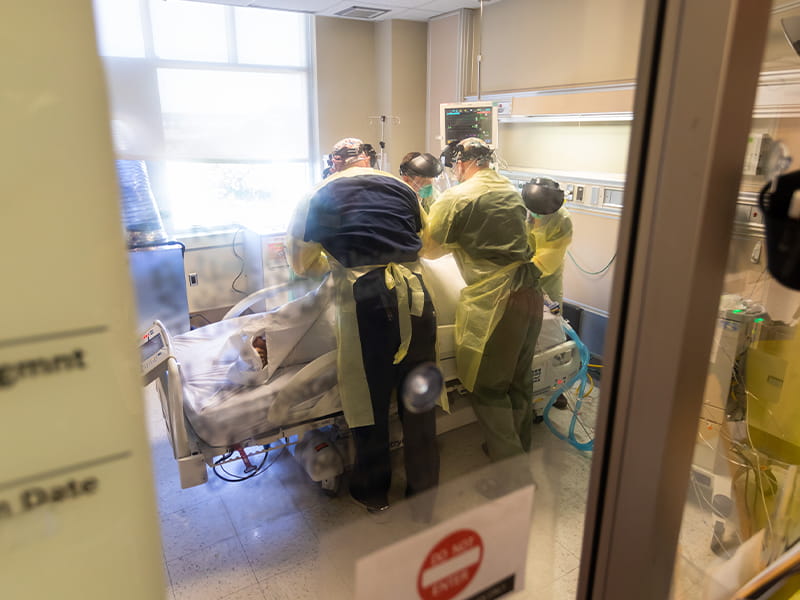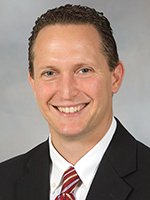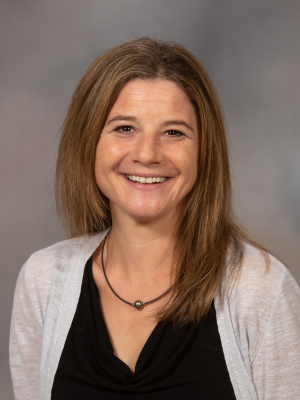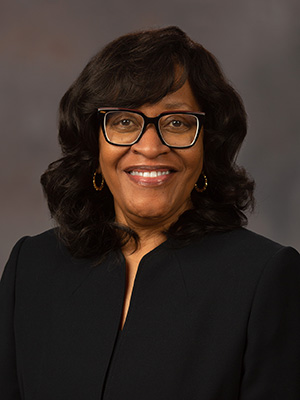UMMC awarded $3M grant to address employee stress, burnout from COVID-19

For two years now, health care workers at the University of Mississippi Medical Center have given their all to help heal patients sickened by COVID-19, and at the same time, those with traumatic injuries and serious diseases.
Many are stressed and burned out. Some have left the profession. A $3 million federal award, however, will allow the Medical Center to offer them new tools for support as they cope with challenges wrought by the pandemic and strive to regain their well-being.

“This is very intentionally designed to reach every category of health care staff. It’s not just about doctors and nurses,” said Dr. Joshua Mann, professor and chair of UMMC’s Department of Preventive Medicine and the grant’s principal investigator. Mann also directs the Office of Well-being, which secured the grant and will implement it.
The Office of Well-being is a service area of UMMC, working independently from other departments to focus on improving the well-being of all faculty, staff and students.
The three-year funding comes from the U.S. Department of Health and Human Services’ Health Resources and Services Administration and is part of an overall $103 million in awards. Ten institutions, including UMMC, were funded through the grant category “Promoting Resilience and Mental Health Among Health Professionals Workforce Program.”
HHS’ goal: Retain health care workers by addressing their mental health needs and by responding to the nation’s critical staffing needs.
UMMC will create new programs through the Office of Well-being to alleviate stress and mental health challenges and to keep those entrusted with patient care on the job. Money also will be used to enhance and expand some current programs, including the RISE (Resilience in Stressful Events) team. RISE offers a workplace support system for caregivers whose stress can become or has become traumatic, hindering their ability to deliver safe and compassionate care.
“This is exciting, because it provides a whole layer of assistance beyond RISE,” Mann said.
The new programs include:
- The Office of Well-Being will offer an interactive program that allows employees to anonymously complete an online form to be screened for stress, depressions and other mental health conditions, and to receive a personal response from a mental health counselor. Employees can also choose to anonymously communicate back with the counselor to receive recommendations, feedback and support for connecting to available services. The grant will allow the Office of Well-being to hire mental health professionals to perform the screening.

Dr. Julie Schumacher, a professor in the Department of Psychiatry and Human Behavior, will work with screeners to identify employees who would benefit from being referred to the department for counseling, and “to identify people who might need an expedited referral for treatment,” Mann said.
“This is the biggest allocation of the funds. To have the staffing to implement an in-depth screening program is a significant step beyond what we can do now,” Mann said.
- The Office of Well-Being will offer online modules, developed by staff across the Medical Center, that are about five minutes long. They’ll help walk employees through how to improve their sleep, reduce anxiety and cope with other mental and physical health challenges exacerbated by past and current stress in their workplace.
“This is also a great way to expand engagement of people throughout the Medical Center on the topic of well-being,” Mann said
- Grant money will be used to provide mini-grants to groups within UMMC who have ideas for process improvement activities related to well-being.
- The Medical Center will take part in national collaborative networks that focus on the needs of clinical employees. “This will include quality improvement projects that revolve around well-being,” Mann said.

The grant can make a significant difference in preserving the well-being of the Medical Center’s 3,000 nurses, said Dr. Kris Cherry, chief nursing executive.
“The well-being of our staff has to be a priority,” Cherry said. “What we’re seeing is a great exodus from health care, and part of that is because of the stress caused by the pandemic. Having the Office of Well-being available to help with building resiliency is key so that we can stabilize our workforce so that employees can provide the best care possible to our patients.”
The UMMC initiatives are in keeping with the grant’s purpose, which is “evidence-informed programs, practices and training, with a specific focus on providers in underserved and rural communities,” Health and Human Services said in a news release. A total 45 health care hospitals and facilities will share in the grant funds.
“ ... The COVID-19 pandemic has intensified issues that have long been a source of stress for front-line health care workers, from increased patient volumes to long working hours,” HHS Secretary Xavier Becerra said in the release.
“While the challenge is complex, these multi-year awards will support proven strategies for health care providers, academic institutions and other recipients to reduce burnout and build resiliency,” the release said.
The American Hospital Association, in its 2022 Environmental Scan report, says that 62 percent of all health care workers say worry or stress related to the pandemic is having a negative effect on their mental health. Thirteen percent report they’ve received mental health services or medication; 20 percent say they need those services but aren’t getting them.
The report also says 22 percent of nurses say they might leave their position providing front-line patient care within the next year because of insufficient staffing, the demands and intensity of the workload and their job’s emotional toll.
And, the report says that 50 percent of health care workers queried by the AHA in July 2020 said the emotional health and well-being of staff was their top pandemic challenge – and that jumped to 75 percent for those queried in August 2021.
Support for front-line caregivers and all involved in patient care – potentially, about 6,000 Medical Center employees – “was recognized as being needed before the pandemic,” Mann said. “The issues around burnout led to the creation of the Office of Well-being.
“It’s obvious that the stress of the past two years has made it worse,” Mann said. “We have health care staff who are mentally exhausted, and they’ve accumulated stress from the pandemic. We will be dealing with that fallout for some time.”
New programs can meet employees where they are – for example, online modules preferred by some younger employees, or face-to-face counseling for those who want that personal interaction, Cherry said.
“A grant like this can help us not only identify and pick up on symptoms such as feeling hopeless or burned out, but also have different options to access services. It will offer us tools to be able to reach out to staff so that they feel comfortable.”


